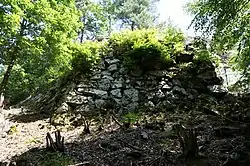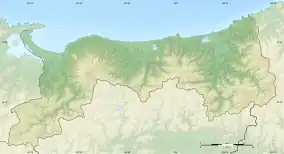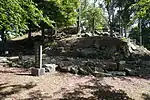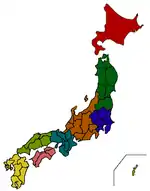| Wakasa Oniga Castle | |
|---|---|
若桜鬼ヶ城 | |
| Wakasa, Tottori Prefecture, Japan | |
 Rokkaku Stone wall | |
 Wakasa Oniga Castle  Wakasa Oniga Castle | |
| Coordinates | 35°20′13″N 134°23′53″E / 35.336944°N 134.398056°E |
| Type | mountaintop-style castle |
| Site information | |
| Condition | ruins |
| Site history | |
| Built | 13C |
| Built by | Yabe clan |
| Materials | Stone walls |
| Demolished | 1617 |
| Events | Siege of Wakasa Oniga Castle |
| Garrison information | |
| Past commanders | Yamanaka Yukimori, Yagi Toyonobu, Yamazaki Iemori |
Wakasa Oniga Castle (若桜鬼ヶ城, Wakasa Oniga-jō) was a Sengoku period mountain-top Japanese castle located in what is now the town of Wakasa, Tottori Prefecture, in the San'in region of Japan. The ruins of the castle were designated a National Historic Site in 2008.[1][2][3][4]
History
Wakasa Oniga Castle was located on the 150-meter Mountain Tsuruoyama in southeastern Inaba Province. It commanded a juncture of the roads from Tottori to Kyoto and to Harima Province. This area had been under the control of the Yabe clan since the Kamakura period, and was the site of a small fortification. During the Sengoku period, when the area came under the control of the Yamana clan, the shugo of Inaba Province, the castle was rebuilt. In the 15th century, Inaba was fiercely contested between the weakened Yamana, and their powerful and aggressive neighbors, the Amago clan and Mōri clan. In 1575, Yamanaka Yukimori entered the castle However, attacked by the Mōri clan and abandoned the castle.[5] With the rise of Oda Nobunaga, Inabe Province was conquered by Toyotomi Hideyoshi, he assigned Wakasa Oniga Castle to a relative, Kinoshita Shigekata. The castle was completely rebuilt per contemporary castle design concepts, such as the extensive use of stone walls, and Kinoshita was forced deeply in debt to pay for the construction.
The castle occupies the summit of the triangular-shaped hilltop in three concentric enclosures. The central bailey at the summit is roughly pentagonal, with 50-meter sides, and contains the ruined foundations of a tenshu which was 10 meters square. The entry to this central enclosure was via a compound gate to the northwest. The second and third enclosures were further down the slopes of the mountains, and each also had a compound gate protected by stone walls. The total size of the castle is about 150 by 50 meters.
Following the Battle of Sekigahara in 1600, Kinoshita Shigekata was forced to commit seppuku. Tokugawa Ieyasu awarded the castle to Yamazaki Iemori, a former Toyotomi retainer who had married a sister of Ikeda Terumasa, and who had rescued Ieyasu's daughter Tokuhime, who had been a hostage held by Ishida Mitsunari to ensure that the Tokugawa remained loyal. His son, Yamazaki Ieharu, found at the Battle of Osaka in 1614-1615 and was rewarded by reassignment to a larger domain in Bitchu Province in 1617, and later to Marugame Domain. After his departure, Wakasa Oniga Castle was unoccupied and was under the control of the Ikeda clan of Tottori Domain. It was abolished and broken due to the Tokugawa shogunate's rules limiting the number of castles per domain.
Preservation
The castle is now only ruins, with stone walls and moats.[3] Wakasa Oniga castle was listed as one of the Continued Top 100 Japanese Castles in 2017.[6]
The castle site is a ten-minute walk from Wakasa Railway Wakasa Station.
Gallery
 Stone wall of Honmaru Base
Stone wall of Honmaru Base Stone wall of Tenshu
Stone wall of Tenshu View from Wakasa Oniga Castle
View from Wakasa Oniga Castle
See also
References
- ↑ "若桜鬼ヶ城" (in Japanese). Wakasa City Official. Retrieved 25 July 2019.
- ↑ "若桜鬼ヶ城" (in Japanese). 観光協会. Retrieved 25 July 2019.
- 1 2 "若桜鬼ヶ城" (in Japanese). じゃらん. Retrieved 25 July 2019.
- ↑ "若桜鬼ヶ城" (in Japanese). 攻城団. Retrieved 25 July 2019.
- ↑ "山中鹿之助" (in Japanese). 戦国武将. Retrieved 25 July 2019.
- ↑ "続日本100名城" (in Japanese). 日本城郭協会. Retrieved 25 July 2019.
External links
- Wakasa Town home page (in Japanese)
